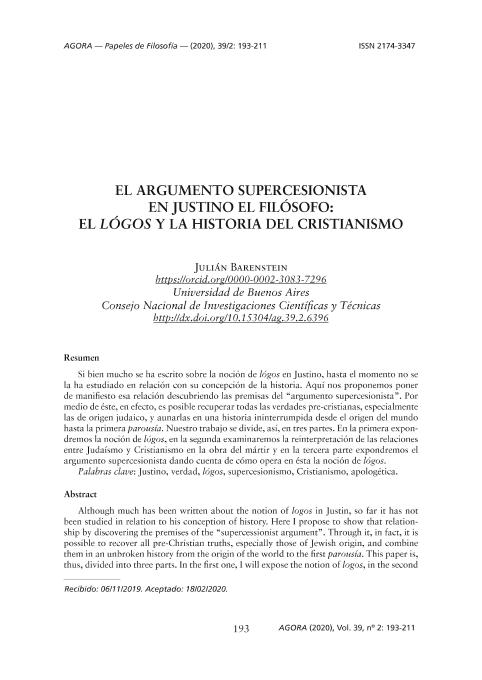Mostrar el registro sencillo del ítem
dc.contributor.author
Barenstein, Julián

dc.date.available
2022-09-29T12:46:46Z
dc.date.issued
2020-08
dc.identifier.citation
Barenstein, Julián; El argumento supercesionista en Justino el Filósofo: El lógos y la historia del cristianismo; Universidadad de Santiago de Compostela. Facultad de Filosofía; Agora; 39; 2; 8-2020; 193-211
dc.identifier.issn
0211-6642
dc.identifier.uri
http://hdl.handle.net/11336/170929
dc.description.abstract
Si bien mucho se ha escrito sobre la noción de lógos en Justino, hasta el momento no se la ha estudiado en relación con su concepción de la historia. Aquí nos proponemos poner de manifiesto esa relación descubriendo las premisas del “argumento supercesionista”. Por medio de éste, en efecto, es posible recuperar todas las verdades pre-cristianas, especialmente las de origen judaico, y aunarlas en una historia ininterrumpida desde el origen del mundo hasta la primera parousía. Nuestro trabajo se divide, así, en tres partes. En la primera expondremos la noción de lógos, en la segunda examinaremos la reinterpretación de las relaciones entre Judaísmo y Cristianismo en la obra del mártir y en la tercera parte expondremos el argumento supercesionista dando cuenta de cómo opera en ésta la noción de lógos.
dc.description.abstract
Although much has been written about the notion of logos in Justin, so far it has not been studied in relation to his conception of history. Here I propose to show that relationship by discovering the premises of the “supercessionist argument”. Through it, in fact, it is possible to recover all pre-Christian truths, especially those of Jewish origin, and combine them in an unbroken history from the origin of the world to the first parousía. This paper is, thus, divided into three parts. In the first one, I will expose the notion of logos, in the second will examine the reinterpretation of relations between Judaism and Christianity in the work of the martyr, in the third part will show the supercessionist argument explaining how the notion of logos operates in it.
dc.format
application/pdf
dc.language.iso
spa
dc.publisher
Universidadad de Santiago de Compostela. Facultad de Filosofía
dc.rights
info:eu-repo/semantics/openAccess
dc.rights.uri
https://creativecommons.org/licenses/by-nc-nd/2.5/ar/
dc.subject
JUSTINO
dc.subject
HISTORIA
dc.subject
LÓGOS
dc.subject
SUPERSESIONISMO
dc.subject.classification
Otras Filosofía, Étnica y Religión

dc.subject.classification
Filosofía, Ética y Religión

dc.subject.classification
HUMANIDADES

dc.title
El argumento supercesionista en Justino el Filósofo: El lógos y la historia del cristianismo
dc.title
The supercessionist argument in Justin the Philosopher: The lógos and the history of Christianity
dc.type
info:eu-repo/semantics/article
dc.type
info:ar-repo/semantics/artículo
dc.type
info:eu-repo/semantics/publishedVersion
dc.date.updated
2022-09-16T20:57:10Z
dc.identifier.eissn
2174-3347
dc.journal.volume
39
dc.journal.number
2
dc.journal.pagination
193-211
dc.journal.pais
España

dc.journal.ciudad
Santiago de Compostela
dc.description.fil
Fil: Barenstein, Julián. Consejo Nacional de Investigaciones Científicas y Técnicas; Argentina. Universidad de Buenos Aires; Argentina
dc.journal.title
Agora
dc.relation.alternativeid
info:eu-repo/semantics/altIdentifier/url/https://revistas.usc.gal/index.php/agora/article/view/6396
dc.relation.alternativeid
info:eu-repo/semantics/altIdentifier/doi/https://doi.org/10.15304/ag.39.2.6396
Archivos asociados
